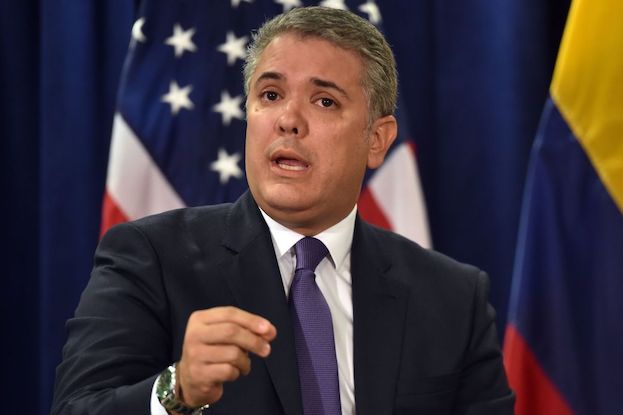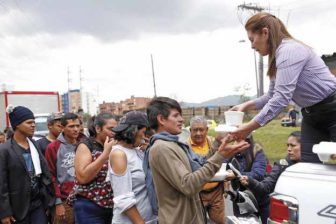BOGOTÁ – While Colombia’s President Iván Duque has continued and even expanded his predecessor’s open immigration policy toward Venezuela, his administration has taken a substantially different tack when it comes to dealing with Nicolás Maduro.
Where the administration of former President Juan Manuel Santos focused on aiding a process of negotiation and transition in Caracas, Duque has hardened Colombia’s position, aligning himself with the U.S. and elements of the Venezuelan opposition intent on deposing Maduro in the near term.
At present, with Venezuela’s opposition leader Juan Guaidó weakened any hopes of a resolution to the crisis resting on negotiations in Oslo, Duque appears to have taken the wrong approach. Unless he can overcome domestic pressures and change diplomatic course, Colombia could be forced to take a back seat when a transition eventually does occur next door.
But the motivating factors behind Duque’s initial approach to the Venezuelan crisis suggest such a change will be difficult. The first has to do with the long-term understanding that exists between his political party, the Democratic Center, and the radical wing of the opposition in Venezuela.
Both former Colombian President Álvaro Uribe and this bloc of the Venezuelan opposition have argued that the only way to resolve the crisis is through Maduro’s immediate removal. Duque himself has suggested that he does not support a military solution to the crisis, but he has been clear in the view that Maduro needs to go, and quickly. (Duque has also, at times, seemed to support the U.S. position of leaving intervention on the table.)
In addition to the Democratic Center’s preference for a hardline approach towards Venezuela, there is also an inclination in the Duque administration to align itself with the foreign policy positions of the United States. This relationship was also a key element of Colombian foreign policy during the Uribe administration, and still exerts considerable influence on the current government’s international decision-making process. As a result, the Colombian government has returned to its alignment with Washington concerning drug policy, and its position vis-à-vis regime change in Venezuela has grown closer to the views of the Trump administration.
This position has at times appeared to pay dividends for Duque’s government. When Duque emerged as a leading international voice on the Venezuelan crisis, his heavy-handed discourse against Maduro benefited him politically at a time when his government had been considered weak and was suffering low approval ratings.
The Colombian initiative to create a diplomatic blockade (cerco diplomático) of Venezuela based on growing international support for Guaidó gave the public the impression that Duque had served as a prominent regional player, a development that was well received in Colombia.
But gradually, the Colombian position has become less clear. Duque’s leadership on Venezuela peaked as the governments of the United States and Colombia sought to weaken the Venezuelan regime by trying to pass humanitarian aid across the border against its will. Maduro’s hold on power began to look untenable, and Duque’s role in the Lima Group and his effort to align this bloc of countries with the position of the United States appeared to be part of a grand strategy that would quickly lead to the demise of the Venezuelan regime.
But while in February Duque asserted that the “dictatorship of Venezuela has very few hours left,” Maduro managed to tighten his control. Over time, international support for Guaidó lost its drive, and the United States’ and Colombia’s threats to use force were sapped of credibility when it became clear that Donald Trump, at odds with his national security adviser John Bolton, was reluctant to intervene militarily in the Venezuelan case. Additionally, the belief that the diplomatic blockade would end the Maduro regime proved to be overly optimistic.
In the weeks since Guaidó’s uprising on April 30 failed to topple Maduro’s government, Duque has become increasingly quiet on the Venezuela issue, and Colombian diplomacy has hit a dead-end.
Alignment with Washington did not yield the expected results: Trump has openly expressed his dissatisfaction with Duque’s efforts regarding the war on drugs and has gone so far as to threaten the government with decertification of Colombia as a drug-war ally. The diplomatic blockade and the threat of use of force have so far failed, and despite weakening the Venezuelan government to a certain extent, the only real solution to the crisis now under consideration – despite difficulties and recent setbacks – is negotiation.
But while Colombia’s role in the crisis has been pushed to the background, Duque still has room to lead. He can play an important role in helping the Lima Group and the International Contact Group to increase international pressure in favor of an authentic negotiation where neither Venezuela’s opposition nor the Maduro regime can avoid fulfilling their commitments.
Taking a prominent role in promoting negotiation would be highly advantageous for Colombia. Not only would Duque’s administration return as an active participant in the resolution of the crisis, but in the process it could develop solutions to bilateral problems with Venezuela, such as the flow of migrants, that should be part of any transition agreement.
Unfortunately, the domestic costs to Duque of embracing negotiations may be too high. He lacks the political capital to confront Uribe and the extreme factions of his own party, which have always been in favor of pressure and threats to push Maduro from office, and view talks as an inferior alternative. Duque has been unable to build consensus with other parties and to make headway against the hardliners in his own. Unless that changes, Duque could remain on the outside looking in, and Colombia’s absence in the design of a Venezuelan transition could become increasingly noticeable, to the detriment of both sides.
—
Borda is an associate professor of political science at the University of the Andes in Bogotá, Colombia. Follow her on Twitter @sandraborda








